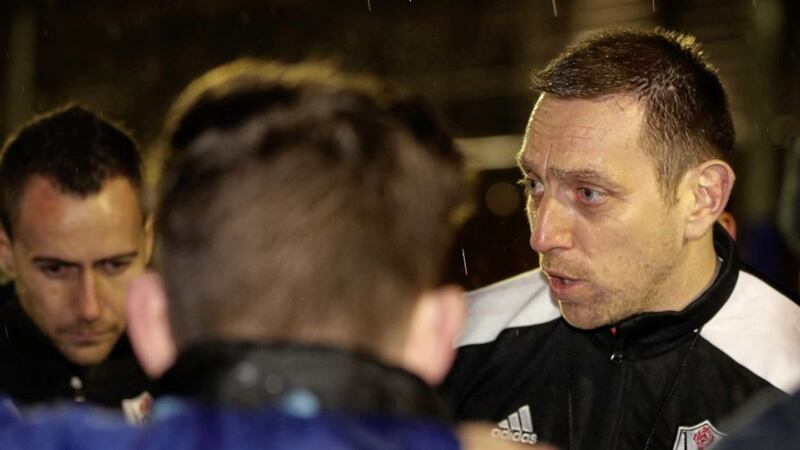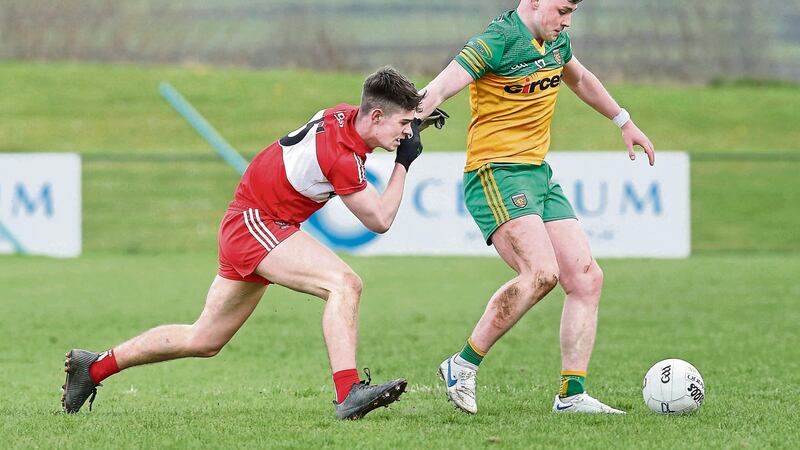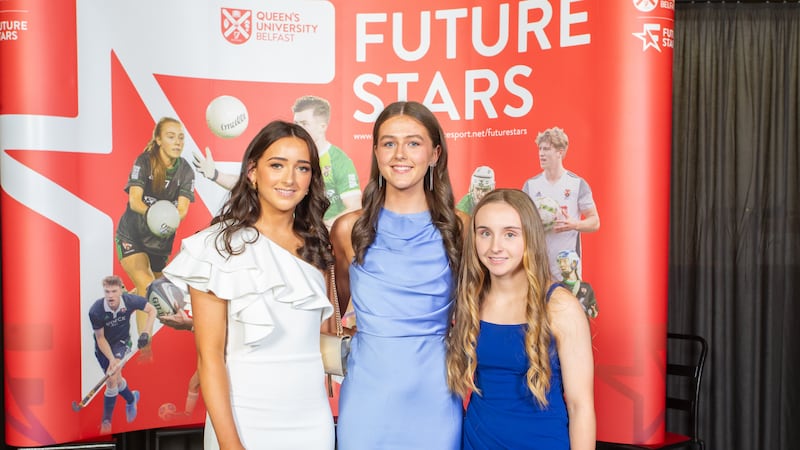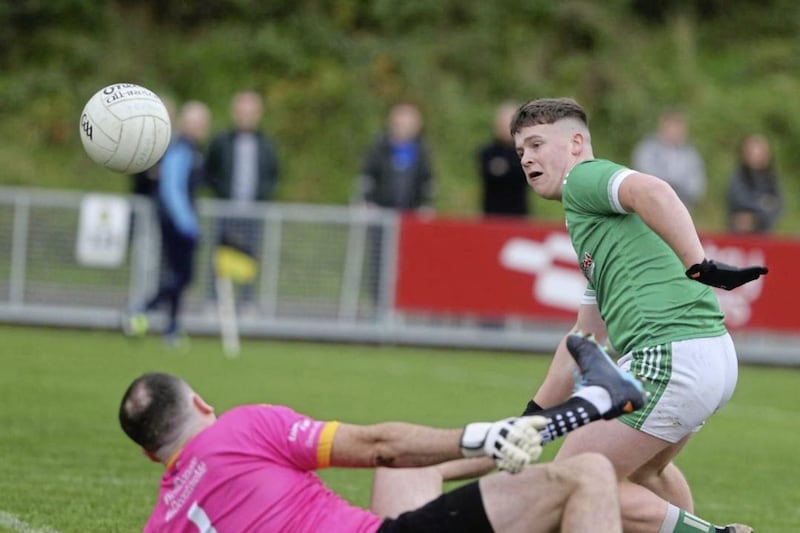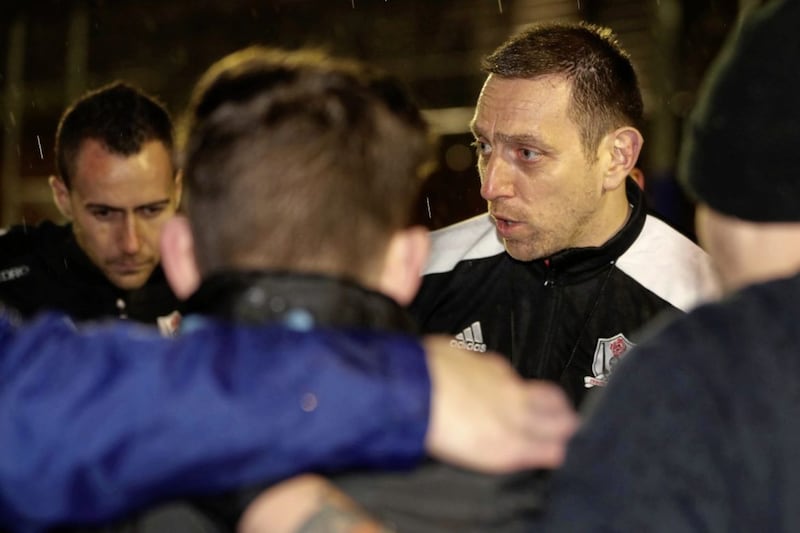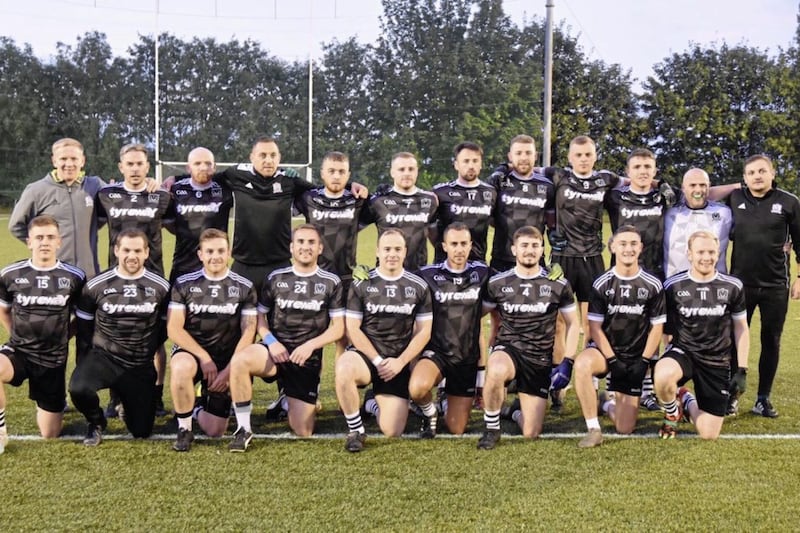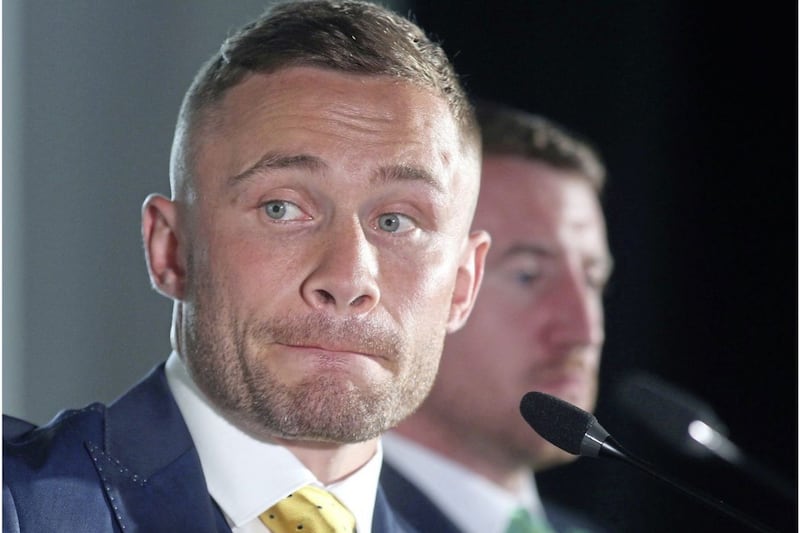In the second part of Paddy Murray's interview, the St Gall's man tells Brendan Crossan about working with Michael Mansfield QC on the Ballymurphy Killings case, trying to win a Junior Championship with Ardoyne Kickhams and the day his grandmother Molly told him to study law...
‘You should be a lawyer, Patrick’ – Grandmother Molly Murray.
MOLLY Murray was fascinated by the career of Michael Mansfield QC. The Englishman was involved in overturning several high-profile miscarriages of justice cases: the Guildford Four and the Birmingham Six among them.
Now there was a man making a difference, Molly thought.
“I grew up not far from where my offices are on the Springfield Road - in Clonard,” says Paddy Murray.
“My family was subjected to harassment from the army and we’d lost some loved ones in the conflict as well.
“I remember my grandmother – Molly Murray – was reading an article in a newspaper and it was about a guy called Michael Mansfield QC.
“He came from a Tory background, his parents were very much pro-Thatcher and in his younger years he actually electioneered for Thatcher.
“And this newspaper article that Molly was reading was about his transformation from that to this social justice lawyer and all the various human rights campaigns and enquiries.”
The 70s and 80s were dark days here.
Like many parts of the north, west Belfast endured quite a lot during the conflict and has the scars to prove it.
Paddy’s father ‘Spike’ Murray was a political prisoner.
While he was serving time, Spike’s cousin Dan McCann helped look after Paddy and Sean, his elder brother by 10 months, and their sister Roisin.
Sean was a “bit of an imp” in his youth.
Paddy recalls: “One day, our Sean was up to no good and I remember Dan – we called him our uncle Dan – giving him a kick up the arse. Sean turned around and said: ‘Uncle Dan, you’re not my Da.’ - to which Dan replied: ‘While your Da’s in jail, I am your Da!’”
A member of the IRA, Dan McCann was shot dead in Gibraltar in 1988 by the SAS alongside Mairead Farrell and Sean Savage.
Molly sowed the first seeds in her grandson’s mind about becoming a lawyer – just like that great man in the newspaper.
Sitting in his office on the lower Springfield Road on this breezy Friday afternoon, Paddy says: “My grandmother always spoke very highly of Michael Mansfield…
“She stressed to me that if you’re going to help your community we need people that’s educated. She said: ‘You should be a lawyer.’
“From a very young age I wanted to be a lawyer. I also wanted to work with Michael Mansfield one day.”
Another of Murray’s ambitions was to open offices in the Clonard area or Springfield Road – where he was born and bred.
“I’m five or six doors from my mother’s house,” he says.
In the beginning he was the sum total of the staff at Ó Muirigh Solicitors.
“Obviously over time you’re able to build your staff up and delegate more work.”
Under his St Gall’s club-mate Mickey Culbert, Murray had enjoyed a couple of seasons with the Antrim senior footballers in the mid-Noughties.
Murray was a steady presence in goal.
Culbert always encouraged Murray to come out with the ball and act as a seventh defender.
He would leave his goal, advance up field with the ball before off-loading and trotting back to his sentry position.
Murray enjoyed his time as Antrim’s number one, but his head was already being turned by rugby.
He’d celebrated his 30th birthday and had always wanted to give the oval ball a go.
“St Gall’s had trained over beside the Cooke Rugby Club pitches and I was very impressed with the facilities.
“I checked the club’s website and I turned up to training one night. I’d no rugby background and I never looked back. I played nine years with them.
“I’ve no regrets whatsoever. Even though St Gall’s had won an All-Ireland in the interim [2010], I met a great bunch of fellas at Cooke.
“Rugby players are keen to get GAA players because of our handling skills. Because I did goals I took the kicks for the team.
“For the line-outs they were throwing me up. Within a season or two I was captain of the second and third teams and – remember captaining in rugby is a big deal - the captain makes a lot of calls.”
Laughing, Murray says: “I didn’t know all the rules. So the referee was coming to me at times and asking: ‘Do you want a scrum or a line-out?’ And I’d say to the lads: ‘Lads, what do you reckon?’
“It was credit to the Cooke club that they took me in, even though I came from a very different background. I became one of them in a very short period of time.
“I played with police officers, I played against them. I played with mostly guys from a unionist background and I made good friends. I’d like to think they had the same respect for me as I had for them.”
Murray loved playing for Cooke. At the same time his own legal career was flourishing.
He took on a series of high-profile legacy cases that attracted plenty of media attention. His pursuit of justice on behalf of victims’ families wasn’t met with universal approval.
The PSNI informed him that he was under death threat from a loyalist paramilitary group.
A newspaper carried a front page story of the death threat against him and on one of its inside pages they had super-imposed a target image on Murray’s head.
The death threat in itself didn’t unnerve him; it was the overwhelming sense that his rugby career was over as he didn’t want to bring any unwanted attention to the fellas over at Cooke.
“My father was a former political prisoner and all of that was mentioned in the article. I remember sitting in St Gall’s thinking: ‘That’s my rugby career finished. I don’t think I’ll go back after that.’
“And then my phone rang and I was getting a few text messages from the guys at the Cooke Rugby Club and they were saying: ‘We just want to let you know Paddy, we saw the article and if there’s anything we can do…’
“So I felt I had to go back and I played another couple of seasons because I wanted to show them that I appreciated what they’d done. They showed absolute solidarity with me.
“It showed that sport can transcend a lot of this stuff. They were my team-mates. I would have done anything for them, on or off the pitch, and they reciprocated. That really meant a lot to me.”
Murray, meanwhile, was at the forefront of the Ballymurphy families’ quest for justice after 10 people were gunned down in August 1971.
Three years ago, he contacted Michael Mansfield QC to get involved in the Ballymurphy cases.
As well as captaining Cooke, Murray still found the time to play for St Gall’s reserves and coach some of their underage teams.
“I remember emailing Michael Mansfield explaining I wanted to have a chat with him.
“He told me to ring him on the Sunday. We were due to play in the Beringer Cup final against the ‘Johnnies’ and I knew it could be my last game.
“I asked Michael could he put it back an hour or so and I remember when the final whistle went – we lost the final – I ran into the changing room to get my phone.
“He already knew everything about the Ballymurphy case and he said he wanted to do it.
“I said: ‘Yes, Michael, but there’s a caveat.’ The phone went silent.
“I said: ‘Promise me that you’ll come to Clonard and meet my grandmother. She’s a big, big fan of yours.’
“He said: ‘No problem.’”
On March 26 2015, Murray picked Mansfield up at the airport. They discussed the finer details of the Ballymurphy case. Mansfield was on board.
“Before you go, you’ve to fulfil your promise,” Murray said to his visitor.
“I phoned Molly: ‘Molly, get the kettle on. I’ve a visitor with me.’
“I took photos of Michael Mansfield on our settee, holding Molly’s hand, having a cup of tea and biscuits. It went full circle. I always wanted to work with him – but even better, I got him round to Clonard to meet Molly.”
While the victims’ families of Ballymurphy await an inquest in September, in more recent times Murray’s offices reached successful outcomes with other legacy cases.
Francis Rowntree, an 11-year-old shot dead by a British army rubber bullet on the Falls Road in 1972; brother-in-laws Joe Parker and Barney Watt, killed in 1971, and in the same year Harry Thornton who was gunned down by the British Parachute Regiment exactly where Murray’s offices are now.
“On each occasion the court found that lethal force used wasn’t justified,” Murray says matter-of-factly, with civil proceedings in some of those cases on-going.
“Obviously the [Ballymurphy] families, they know the truth what happened their loved ones.
“They knew the day their loved ones were shot they were innocent. But the truth is not enough for them. What they want is justice, official acknowledgement.
“The official version is still that these people were gunmen and gunwomen and the force used was justified. Many of these people from these communities were treated very harshly by the criminal justice system and the criminal justice system became an opportunity to deny human rights abuses [took place]…
“For me, what’s really, really important about future generations is to have confidence in the criminal justice system. All people want in these communities is a fair crack of the whip, to get a fair hearing. If we have that, then it becomes much more difficult for those who argue an alternative.”
He adds: “I have campaigners now whose grandfathers were killed years ago. They weren’t even born when some of these things happened but they still feel a burning sense of injustice and they carry that.
“We need to lift that off them so that they have confidence in the institutions of justice and not that they’re just there as physical buildings.
“It’s like a sore. You pick it and it will never heal. We need to heal it. And a key part of reconciliation is actually all sides to acknowledge what they did. It’s to have a proper legal verdict. These families knew on the day that their loved ones were innocent but they deserve a proper legal verdict.”
Will they get a proper legal verdict, you ask.
“In any particular case you won’t get 100 per cent of the truth. There are different reasons for that. Evidence has been destroyed, witnesses have died, the initial failed investigation... You can’t have those investigative opportunities again.
“The inquest system can give families answers, if done properly. You have to remember the original inquests were absolutely flawed; families were sometimes not represented, soldiers weren’t compelled to be witnesses, families didn’t get disclosure of all the documentation.
“But given the development of the European Court of Human Rights, that’s changed. An inquest can now become a mechanism for families to get some answers.”
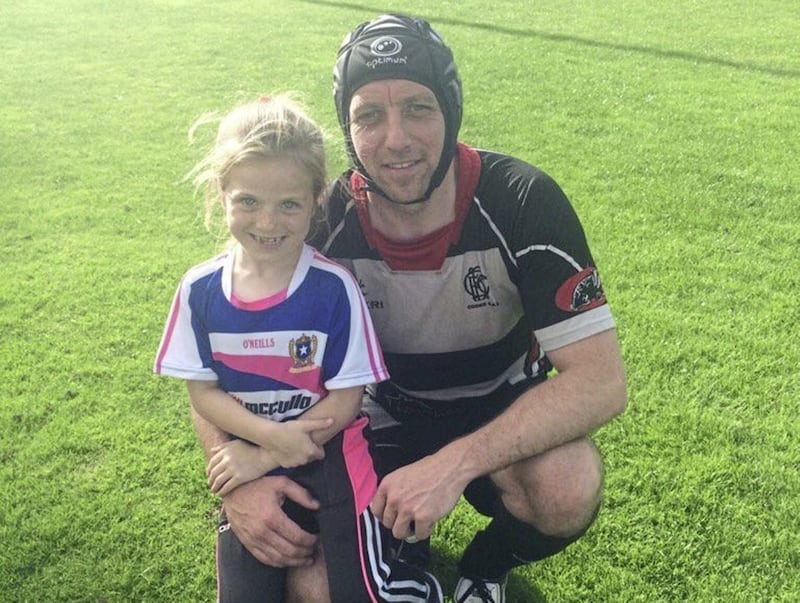
Murray, a father-of-five, is still involved in taking underage teams at St Gall’s and has doubled his workload in recent weeks by becoming the manager of Ardoyne Kickhams.
As the saying goes: if you want something done, get a busy man to do it. You imagine there aren’t enough hours in the day for Murray to do all the things he wants to do.
“I made a conscious decision to go back into St Gall’s and start taking the underage teams. Once it comes to five or six o’clock I need to be somewhere else. If I don’t I’ll stay here.
“It’s better than standing out in the fresh air in the ‘Crickey’ [Ardoyne’s pitch on the Cliftonville Road] than sitting in a stuffy office. I need to do this. It’s good for me.
“I’ve a very supportive wife [Pauline] who is mad into her GAA, although she’s still not 100 percent about the Ardoyne thing given here devotion to St Gall’s, but she understands and gets it.
“I was attracted to Ardoyne for a lot of different reasons. First of all, there is a lot of potential. I think they’re a sleeping giant. There is a real sense of identity in Ardoyne and I think they deserve a good Gaelic team.
“Having strong senior football and hurling teams would be good for the community as well.
“They’ve had many years of disadvantage and been in the news for the wrong reasons at times… They have great numbers, they’ve great kids, so I felt this was a club that was going in the right direction and something I’d like to be involved in and see if I can do something with them.”
Paddy Murray has travelled some road since that afternoon in 2006 when a slate fell from his roof, hit his foot and ruled him out of an All-Ireland final with St Gall’s.
He’s had a rugby career and made friends for life at Cooke.
He’s had a death threat and pursues justice like it was the next ball.
“This may sound a bit corny,” he says, “but I love what I do. I get up every morning and I go and do the best job I can do. I’m very, very lucky.
“Every day I come into work I’m motivated. Would I be happy now [if it ended]? No. There are too many inquests – the Ballymurphy Inquest starts in September. I want to finish all of these cases and I haven’t won a Junior Championship with Ardoyne.”
Molly’s advice to her grandson all those years ago was the best kind: 'Go and get educated and help your community.'
That's what her grandson went and did. He'd no choice, really. Sure he couldn't let Molly down...
